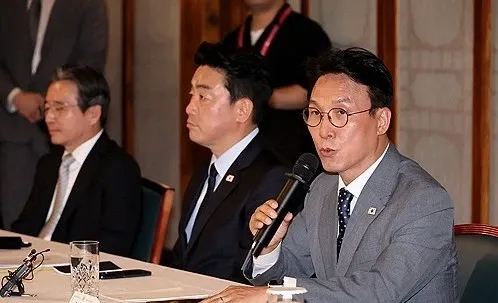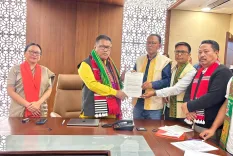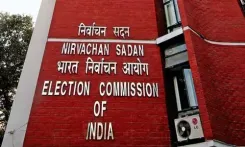How is South Korea's Government Addressing Inflation?

Synopsis
Key Takeaways
- Government and ruling party commit to stabilizing prices.
- Implementation of the supplementary budget is prioritized.
- Consumer prices rose by 2.2% year-on-year in June.
- Processed food prices increased by 4.6%, impacting overall inflation.
- Measures for natural disaster preparedness are underway.
Seoul, July 6 (NationPress) The government and the ruling party have come together to commit to a comprehensive effort aimed at stabilizing prices and rapidly implementing the supplementary budget to better support citizens' livelihoods and stimulate economic growth, officials reported.
This agreement was reached during a high-level policy coordination meeting held at the Prime Minister's residence in Seoul, bringing together the ruling Democratic Party (DP) and government officials.
The meeting was significant as it was the first since Prime Minister Kim Min-seok assumed office following his parliamentary confirmation hearing.
Party spokesperson Park Sang-hyuk stated at a press briefing, "There was a mutual recognition that every effort must be made to stabilize perceived inflation, especially as persistent high prices are affecting the public's quality of life."
The ruling party emphasized the importance of maintaining close communication with industry stakeholders to mitigate price hikes in processed foods, thereby reducing the burden on consumers. The government responded positively, agreeing to consider these concerns actively.
Recent government data shows that consumer prices—a critical measure of inflation—rose by 2.2 percent year-on-year in June, marking the most significant increase since January.
Specifically, prices for processed food items surged by 4.6 percent year-on-year, representing the highest rise since November 2023, contributing an additional 0.39 percentage point to the overall inflation rate last month.
During the discussions, the DP urged the government to expedite the implementation of the second supplementary budget to avoid missing a crucial opportunity for economic recovery. The government indicated plans to execute 85 percent of this budget by the end of September.
The Cabinet approved an extra budget bill of 31.8 trillion won (approximately US$23.3 billion), marking the inaugural supplementary budget under the Lee Jae Myung administration.
Additionally, the government pledged to take proactive measures to prepare for natural disasters such as floods and storms, and both parties agreed to improve responses to heat waves, according to Park.
In his opening remarks, Prime Minister Kim emphasized that this meeting serves as a critical platform for aligning the national agenda.
"We intend to explore strategies to maximize the impact of the supplementary budget, public relief measures, and thorough preparedness for summer disasters like heat waves," the Prime Minister elaborated.
Participants from the ruling party included Kim Byung-kee, the floor leader and acting party leader, alongside Rep. Jin Sung-joon, the chair of the party's policy committee.
They were joined by Prime Minister Yoon Chang-ryeol, the chief of the Office for Government Policy Coordination, and First Vice Minister of Economy and Finance Lee Hyung-il.
DP floor leader Kim urged the government to act promptly across multiple fronts, highlighting the urgent need to implement the supplementary budget, alleviate the impact of high inflation, and prepare for heat waves.










